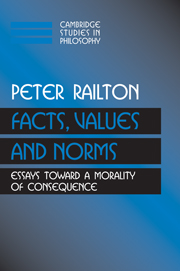Book contents
- Frontmatter
- Contents
- Foreword
- Part I Realism about Value and Morality
- Part II Normative Moral Theory
- 6 Alienation, Consequentialism, and the Demands of Morality (1984)
- 7 Locke, Stock, and Peril: Natural Property Rights, Pollution, and Risk (1985)
- 8 How Thinking about Character and Utilitarianism Might Lead to Rethinking the Character of Utilitarianism (1988)
- 9 Pluralism, Dilemma, and the Expression of Moral Conflict (1992, 2001)
- Part III The Authority of Ethics and Value – The Problem of Normativity
- Index
6 - Alienation, Consequentialism, and the Demands of Morality (1984)
Published online by Cambridge University Press: 18 December 2009
- Frontmatter
- Contents
- Foreword
- Part I Realism about Value and Morality
- Part II Normative Moral Theory
- 6 Alienation, Consequentialism, and the Demands of Morality (1984)
- 7 Locke, Stock, and Peril: Natural Property Rights, Pollution, and Risk (1985)
- 8 How Thinking about Character and Utilitarianism Might Lead to Rethinking the Character of Utilitarianism (1988)
- 9 Pluralism, Dilemma, and the Expression of Moral Conflict (1992, 2001)
- Part III The Authority of Ethics and Value – The Problem of Normativity
- Index
Summary
INTRODUCTION
Living up to the demands of morality may bring with it alienation – from one's personal commitments, from one's feelings or sentiments, from other people, or even from morality itself. In this article I will discuss several apparent instances of such alienation, and attempt a preliminary assessment of their bearing on questions about the acceptability of certain moral theories. Of special concern will be the question whether problems about alienation show consequentialist moral theories to be self-defeating.
I will not attempt a full or general characterization of alienation. Indeed, at a perfectly general level alienation can be characterized only very roughly as a kind of estrangement, distancing, or separateness (not necessarily consciously attended to) resulting in some sort of loss (not necessarily consciously noticed). Rather than seek a general analysis I will rely upon examples to convey a sense of what is involved in the sorts of alienation with which I am concerned. There is nothing in a word, and the phenomena to be discussed in the following text could all be considered while avoiding the controversial term ‘alienation.’ My sense, however, is that there is some point in using this formidable term, if only to draw attention to commonalities among problems not always noticed. For example, in the final section of this article I will suggest that one important form of alienation in moral practice, the sense that morality confronts us as an alien set of demands, distant and disconnected from our actual concerns, can be mitigated by dealing with other sorts of alienation morality may induce.
- Type
- Chapter
- Information
- Facts, Values, and NormsEssays toward a Morality of Consequence, pp. 151 - 186Publisher: Cambridge University PressPrint publication year: 2003
- 1
- Cited by



